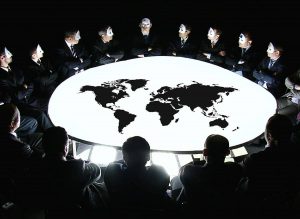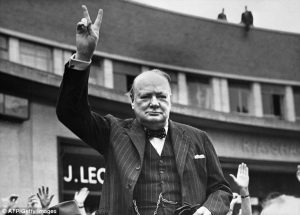The Imperial Political Elite Establishment’s Strategies for Protecting British Power
The opposition is a built-in check and balance to the government. “It has five distinctive characteristics and five distinctive functions. It is organized; permanent; representative (of something like half the nation who look to it to fight their battles); a participant in selecting issues for debate; and the alternative to the group in power.”8 If the government is no longer capable of holding onto power and collapses, the opposition will take office. “This is the logic of the two-party system. It is a zero sum game: what the government side loses the opposition side gains: ‘the more their is of mine the less their is of yours.”9
For quite a long time the United Kingdom has been alternately governed by the Conservative Party or the Labour Party. As was seen in Chapter one, “originally a two-party system evolved for historical reasons as early as the seventeenth century; and it has been maintained partly by the electoral system which penalises minority parties,”10 such as the Libera-Social Democratic Alliance in the 1987 General Election. “It is also maintained, though, because it is seen to possess valuable attributes.”11 One might add that the two-party system is, in fact, the key to understanding how the Constitution really works; it is responsible for six of its characteristics: “the near certainty that one party or the other will have a clear majority in the House; the consequent formation of a Cabinet drown from this majority party; the stability of this Cabinet, since its majority is guaranteed; the durability of this Cabinet for the full term of the Parliament’s life; the unambiguous responsibility of the Cabinet for what happens during its term of office; and the presentation to the electorate of a clear choice between the government party and the opposition.”12
The Labour Political Elite and Protecting British Power and Interests in the Decolonisation Process
I have shown the process of accountability in the British political system and that all policies are debated before being implemented. I can now proceed with the attitudes and policy ideas of the different categories of the British political elite involved in the decolonisation process from 1945 to 1963, with a view to seeing how they sought to maintain Britain’s national interest. My investigation begins with the Labour Cabinet’s policies towards the decolonisation of the British Empire, and how it came about that the Labour leaders found themselves dealing with the problem, and in the way that they did.
The ‘Allies’ had defeated Japan in the Far East, and Germany in Europe. Invading American, British and Soviet armies had liberated Eastern Europe and western Europe. Resistance forces within the European countries themselves had played an important role in the victory. “Britain, its Empire, and all that it stood for had won through. ‘If the British Empire, and its Commonwealth last for a thousand years men will still say this was their finest hour’, said the war-time Prime Minister Winston Churchill in 1940, when nothing seemed able to withstand Hitler and his victorious troops.”13
In Britain the Parliament elected in 1935 had continued to sit throughout the war. Its character had been almost set by a party truce: “it was understood that if a seat fell vacant, the candidate of the party which had previously held it would not be opposed by candidates of the other major parties.”14 This situation was not popular with everybody. It had provoked the emergence of a Commonwealth party and the candidacy of independents who had not felt obliged to accept the truce; and in number of cases they had been successful at by-elections. On the other hand, “the Conservatives were associated with the distress of the 1930s and with attempts to appease the dictators between 1935 and 1938.”15 Obviously a general election could not be delayed.



